Artificial intelligence (AI) is rapidly transforming how businesses operate, make decisions and compete. Often described as the engine of the Fourth Industrial Revolution, AI has progressed from a concept to real-world applications across industries, influencing everything from customer service to supply chain management.
Momentum behind AI adoption is gathering pace. Core technologies like machine learning, computer vision and natural language processing are becoming more affordable and easier to use, even for firms without large tech teams. For companies of all sizes, including small- and medium-size enterprises (SMEs), the question is no longer whether to embrace AI, but how to do it in a way that delivers real results.
Business leaders thus find themselves at a critical turning point. As decision-making speeds up and processes become more data-driven, companies that are slower to adopt AI risk falling behind more agile competitors. At the same time, getting employee buy-in is crucial to successfully execute this organisational change.

“People need to feel assured that AI is here to support and not replace them, relieving them of routine tasks so they can upskill into higher-value roles,” said Mr Andrew Koh, head of Singapore operations at Canon Singapore, which sees itself as a strategic enabler in this transition. “By helping companies start small and scale fast, we want to remove the complexity from AI, make the benefits visible, and drive productivity and business growth.”
FROM THE INFORMATION AGE TO THE IMAGINATION AGE
The rise of AI signals a shift beyond the Information Age. Increasingly, business success depends not just on access to data, but on the ability to interpret, personalise and act on it quickly. This new phase, often referred to as the Imagination Age, is marked by intelligent systems that support creativity, assist in complex decisions and generate new forms of value.
Unlike previous industrial revolutions driven by physical technologies, this era blends digital intelligence with human insight. Companies are expected to innovate faster, deliver more tailored experiences and operate with greater efficiency. AI helps them do so by automating tasks that once required manual effort and applying data in ways that improve outcomes across functions.
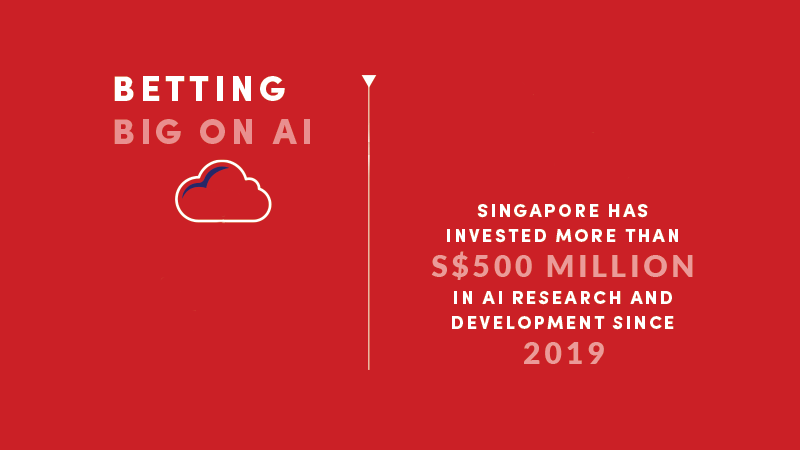
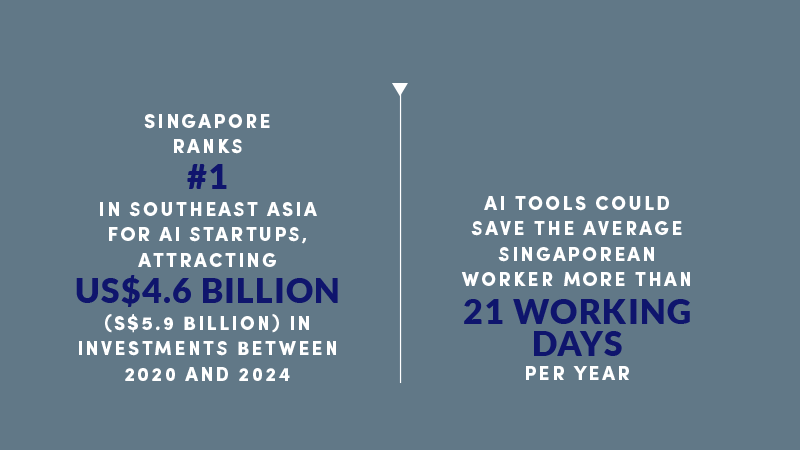
Globally, companies are already responding. A 2024 McKinsey report found that more than 65 per cent of organisations are experimenting with generative AI. Around three-quarters expect the technology to bring significant or disruptive change to their industry.
The same thing is happening right here in Singapore. In his National Day Rally 2025 speech, Prime Minister Lawrence Wong referred to AI as “the defining technology of our time”. Hailing its impact among big global players and neighbourhood dentists alike, he noted, “The real game changer lies in using AI to raise productivity and create new value through every part of the economy.”
From logistics and construction to retail and professional services, businesses are turning to AI to address longstanding challenges and meet rising demands. “No matter the industry, the challenges businesses face today are strikingly similar,” said Mr Koh. “They need to move faster, work smarter and stay secure in a rapidly changing world.”

Yet many SMEs remain cautious. Common concerns include the lack of in-house expertise, the cost of implementation and uncertainty over where to begin. However, AI should not be seen as a complex or inaccessible technology, argued Mr Koh. It should be viewed as a practical tool that helps businesses work more efficiently.
Canon positions itself as both a guide and a partner in this space. Its AI strategy centres on delivering simple, effective solutions that support existing workflows and improve speed, accuracy and productivity. Every solution it offers reflects the belief that technology should be clear, accessible and focused on practical business needs.
MAKING AI WORK FOR BUSINESS
True transformation happens when technology solves operational bottlenecks. With that in mind, Canon’s AI-enabled solutions are built to tackle everyday business challenges, such as automating manual administrative work and processes, strengthening information security, speeding up decision making, and ensuring seamless access across teams to reduce delays and even printer device downtime.
Through its collaboration with technology partner Antelope, Canon brings generative AI capabilities to the market that allow teams to retrieve, summarise, compare, draft and gather insights on complex information quickly through natural language prompts. In surveillance, the company’s AI solutions provide real-time alerts and smart tracking features to improve situational awareness and safety. Meanwhile, its predictive analytics help prevent printer disruptions by flagging technical issues early.
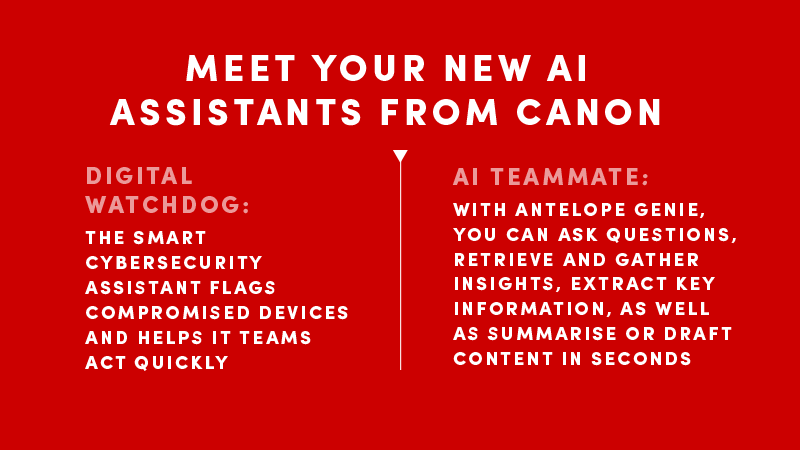
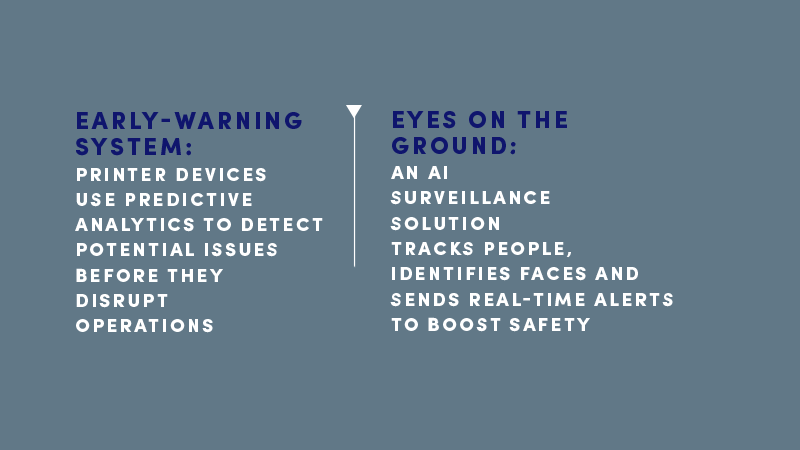
Canon also recognises that SMEs may lack the resources of larger corporations. As such, its solutions are both intuitive and affordable.
In simulated business environments, Canon has demonstrated how AI tools can help solve common challenges. At hybrid townhalls, for instance, AI-enabled cameras with face tracking, auto framing and background options ensure inclusive participation. Meanwhile, Canon’s smart visitor management system uses facial recognition to streamline check-ins at reception. The system also addresses a growing problem in hybrid workplaces — unattended reception desks — by automatically alerting the host via email or SMS when visitors arrive.
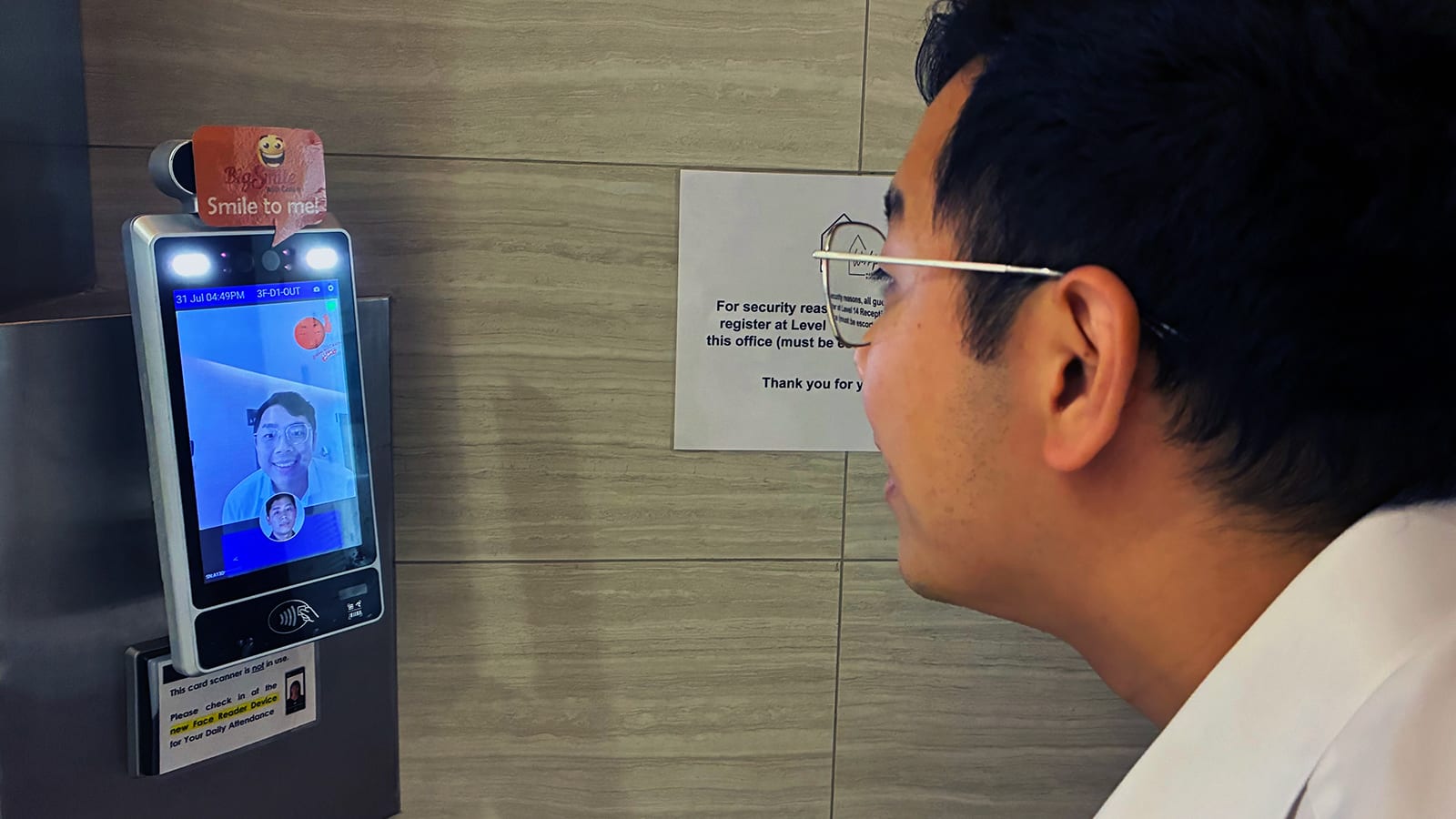
For many companies, the biggest barrier to AI is not interest but execution. To help businesses overcome this obstacle, Canon takes a step-by-step approach. This includes clearly defining problems, demonstrating measurable results through pilot projects, and integrating new solutions with existing tools while minimising disruption to daily work.
“We always ask ourselves, ‘What’s the simplest way to solve the problem with the least disruption?’,” said Mr Koh. This approach reflects the company’s focus on applying technology in ways that support day-to-day work and deliver practical results.
ALIGNED WITH NATIONAL PRIORITIES
Canon’s AI efforts align with Singapore’s national digitalisation strategy. The government’s Budget 2025 reaffirmed its commitment to growing the country’s AI talent pool to 15,000 and boosting adoption through initiatives like the Enterprise Compute Initiative and AI Singapore’s 100 Experiments programme.
PM Wong reiterated this in his National Day Rally 2025 speech. “We will equip and empower every enterprise, especially our SMEs — to harness AI effectively, and sharpen their competitive edge,” he said, while also assuring those worried about being displaced by AI. “We will redesign jobs, and equip and empower every worker … We will do more to help Singaporeans seize new job opportunities.”
To support firms with tighter budgets, Canon works with SME Centres such as SME Centre@SCCCI (Singapore Chinese Chamber of Commerce & Industry) to provide advisory services related to grants and resources that support their digital transformation. These include the Productivity Solutions Grant and the Enterprise Development Grant, which help lower the barriers to trial and adoption.
“Singapore has always been forward-thinking in tech,” said Mr Koh. “We want to support that push by making AI something companies can understand and implement today.”













